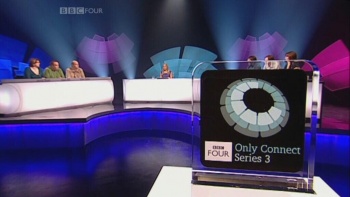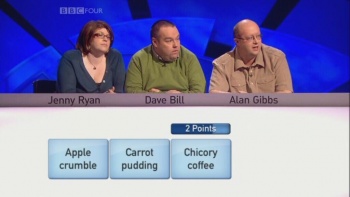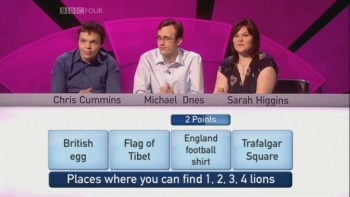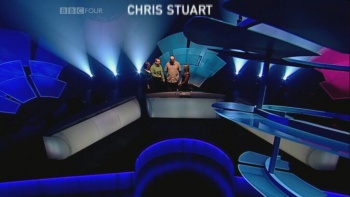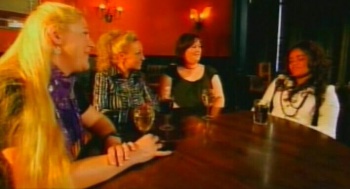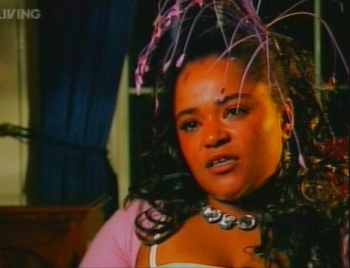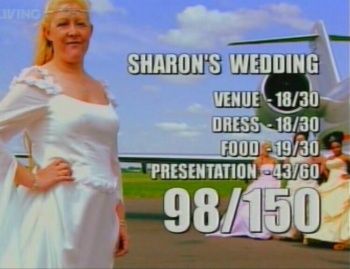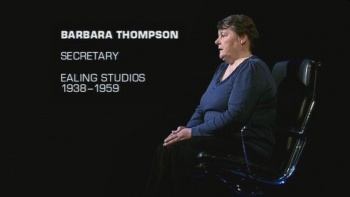Weaver's Week 2010-04-18
Last week | Weaver's Week Index | Next week
"Britain is paralysed by hot air" said the papers this week, after ITV aired a voting show but forgot to invite Simon Cowell. Well done, everybody. The Gameshow General Election 2010 is in full swing, and Simon Cowell's got as much say as the next person.
Contents |
Only Connect
The Grand Final: Strategists v Gamblers
Only Connect host Victoria Coren popped up on Have I Got News for You last week, and correctly pointed out that this show is nothing like the Odd One Out round. Correct, but trivial, we could say the same about Catchphrase. No, Only Connect is the equivalent of the other rounds: first "What's the story", then the "Missing Words" round, then the "Picture Spin Quiz", and a return to "Missing (Bits of) Words" for the final section.
The contestants we're seeing tonight have appeared almost as often as that clip of Robert Kilroy Share-or-shaft. The Gamblers have accounted for the Insurers, the Bowlers, and the Archers Admirers; the Strategists – lovers of obscure European board games – beat the Polymaths, the Neuroscientists, and the Hitchhikers. But the HIGNFY crowd should be aware of one thing: the questions this week really are hard. They're seriously hard. Like, so hard that if these questions got into a jet engine, they'd stop it by the sheer power of fact. We can't get any of the answers, and we've already seen the programme before writing the review.
So, we'll begin with round one, four things, what's the link. The Strategists won the toss and elected to receive, and the Gamblers wonder if Reg Cox off of The Eastenders was brought back to life. No, but the others were, and all four died in the first episode of their show. Two points. Strategists start with East Timor, and wonder if these are countries with only one land boundary, and end up with the River Avon, which they believe is a disputed area. When did Mercia and Wessex last go to war over the Avon? No, they're tautological names – "Timor" and "Avon" mean "River" and "East", a bonus point to the Strategists. They get the picture round: Danish pastries, opium, football. Gamblers get the link: they all gave their name to a war.
Audio round for the Strategists – Aretha Franklin, Beverley Knight, the Steve Millerband – but this goes across for a bonus, as all the performers take names from The Canterbury Tales. Foodstuffs in the Gamblers' final question – apple crumble was, apparently, a wartime invention to eke out rations. Strategists get famous works of art, but – again – the connection goes over, they were all vandalised. Gamblers have a big lead, 7-1.
Do the Gamblers know the history of the EEC expansion? They don't: 6 in 1958 became 9 (UK, IE, DK) in 1973, 10 (Greece) in '81, and Spain and Portugal took the total to 12 in '86, and a bonus for the other side. Pig Latin is the link for the Strategists, and Victoria is harsh but fair not to allow the Gamblers to debate all night – it's "To be or not...". Busiest airports are the Strategists' link, and – like the rest of humanity – they go straight to Hartsfield and three points.
Numbers and racing odds seem to face the strategists, they guess and guess wrong, and the Gamblers pick up a bonus on the strategy-slash-gambling question – it's rolling numbers on a pair of dice. They then find the visual question, which is a very simple link – Hass, Hess, Hiss, Hoss – but profoundly executed. Two points, there. Two points for the Strategists, who go one lion, two lions, three lions, Trafalgar square. It's not going to change the lead, Gamblers are ahead 13-4.
It's the Strategists who kick off the Connecting Walls round, with words taking their name from Julius Caesar. "Is there a group of topless models on there?" asks one of the side. Well, if this show ever needs to transfer to Channel 5... Could there be a set of guitarists in the grid? What's with Soh and Boron? These unusual words are often the clue to solving the grid, something the Strategists haven't done. Soh and Boron were the fifth items in their sequences, along with OC star ε. Formula One teams appear, and there really was a group of topless models there. Page Three Points!
The Gamblers have the other wall, and kick off by looking for vehicles from Bob the Builder. Can they fix it? Yes they blimmin' well can. Brothers are something they think about, then they find some oranges lurking about. Two groups right, three guesses. They spot another group – words containing girls' names – but the final connection is something they can't find in the alloted time. Works by Byron is what's evading them, but their score is impressive. Seven Points!
The Strategists have a reputation for doing well in the final round, but they've got their work cut out – a 20-7 deficit. World Leaders during World War I is the first category, and that goes to the Strategists by 3-0. They can do this. Arithmetical expressions is to the Strategists by 3-1. Famous autobiographies is another Strategist win, 3-0. Surely they're not going to pull this out of the bag! Early musical instruments -- yep, that's with the Strategists 3-1, and that's the end of the show! End of the show! The Strategists improved to 19, but the Gamblers have retained their advantage, with 22 points.
So the Gamblers – Jenny Ryan, Alan Gibbs, and captain Dave Bill – become the third winners of television's toughest quiz. If you think you can match their achievement, applications for series four are already open.
Four Weddings
Carlton (as was) for Living, since June 2009
(This review mostly based on the episode from 14 October 2009)
Four pushy brides. Four different weddings. One fantasy five-star honeymoon. One hour of Living TV. Are we going to get through this without taking a break for something more macho, like the Wacky Races? Actually, yes we are, because once it starts, Four Weddings moves along like Dick Dastardly's jet-propelled car, not stopping until it's finished, or it's grounded by low-flying Only Connect questions.
So, what are we reviewing? It's a show that will acknowledge four co-creators, when it only needs a six-word summary: Come Dine with Me, for weddings. It has an original soundtrack by James Banbury, though we couldn't quite work out if the riff he's working from was the classical "Here comes the bride" or Anne Shelton's hit from the 1950s "Lay down your arms".
So, here's what happens. Four women judge all aspects of each other's weddings, on the pretext that the most interesting aspect is the bitching afterwards. The tone is set right from the start. After describing her plans, bride A says, "It's different, over the top." "I wouldn't like anything over the top," says bride B. Before the first break, we hear the most salient details: who's the bride, where are they doing it, and how much will it cost.
Umm, are we completely and utterly missing something here? Are the most important things here the food, the venue, the ambience, the dress, the amount of money these people have got at their disposal? Or is it, possibly, the commitment that these people are making to each other, in the full view of the public? Is it all about the celebration of a relationship, the spiritual bonds between the participants (both those married and those celebrating with them)? Or, as Living suggests, is it primarily about the details: the cake, the couple dancing to Snow Patrol rather than Robbie Blimmin' Williams, the costume.
Our criticism continues: is it really right to turn up to a wedding with a zillion antennae growing out of one's head? To object to the appearance of a male voice choir? So does the programme's – there's an awful lot of carping and bleating, a tremendous amount of negativity around. The sample episode we saw had a ceremony in a barn, a reception at Portsmouth FC, one modelled on former pop star Peter Andre and one of his ex-wives, and a biker/pagan ceremony. And it was moaning and grousing from start to finish; the producers seem to have gone out of their way to remove any positive comments.
The obvious comparison is Come Dine With Me, and there, Dave Lamb's voiceover is sardonic. It says exactly what we're thinking that split-second before we think it. For Four Weddings, Steve "Sparky" Parker's contribution is never less than obvious, saying exactly what we were thinking about two thoughts ago. When in doubt, the voiceover always goes for the obvious comment.
What we've got here is a bunch of people showing themselves off to their friends, and inviting a few strangers. Those strangers pass judgement based on their own prejudices, their own preconceptions. It's fairly clear who's not going to win, on the grounds of annoying everyone else; when it seems that two of the contestants strike up a bond, they'll do well.
Where do they get these people from? Almost inevitably, the producers trawl the interwebs for the sort of exhibitionists who want their wedding to be seen by a UK audience of, literally, people. We've come across evidence that the producers know what they want – one blog we've found said "ITV are still in need of: A naturist couple who plan to get married (as a naturist wedding) A naturist venue where a wedding can take place."
As we say, the judging is done in true Come Dine With Me style, with marks given in four categories, each introduced every blimmin' time with their own caption in the Impact typeface. It's not an unusual typeface, since this episode aired it's been used on posters promoting at least one political party, and it's previously enjoyed an association with pictures of cats in unusual situations. Be very glad we didn't call this review "I Can Haz Marry?"
Unlike Come Dine With Me, not all of the marks are shown when they're given. Indeed, only a few are revealed, some of the remainder are told in the final part of the show, which begins with the brides turning up to an airport in their wedding dresses, and recreating the Remarkable Melty Faces Bit from the "Black or white" video clip. Then the winning groom is driven up to the terminal; the final scores are given in a garbled voiceover, and that's about it.
Four Weddings was paired in the schedules with Dating in the Dark, which we reviewed two weeks ago. Though superficially about love and attraction, the shows are like chalk and cheese. Dating in the Dark was calm, relaxed, sensible, and really rather well put together. Four Weddings ... well, it looks like one of those Lolcat posters, and we think that is an entirely appropriate motif for the show. A good giggle for a couple of moments, if you're into that sort of thing, but absolutely nothing substantial. And, if things aren't quite spot on, leaving a bit of a sour taste in the mouth.
Still, seeing as how we're channelling old Hugh Grant movies, we expect Living's next show to be the funeral part. People pop their clogs, get interred in the ground, and their relatives give marks out of 20 on the tributes, coffin, and general ambience. We hesitate to think what the prize might be, probably something involving a fake psychic. That's Come Die With Me, coming to a television near you... well, never, we hope.
Mastermind
Final eliminator 3
Hang on, what happened to Final Eliminator 2? Er, good question. It's what the continuity announcer calls A Change to the Advertised Programme. Life After Mastermind has seen the programme, and if you don't want to know what happened, don't read the summary. And we realise that if Humphrys didn't take forever to get the show going, the contenders could have 100 seconds of specialist questions.
Anyway. John Cooper kicks us off this week, he's got the History of the British Army 1660-1914. The British army is ... look, we really can't be bothered spelling this out. If you don't know what the British army is, then might we recommend that you step away from this show, and watch something less intellectually demanding. ITV2's rather good at that. It's a good start, perhaps losing step part-way through, but 11 (0) is not to be slighted.
Gavin McEwan tells about the Life and Music of Burt Bacharach (b 1926) The man who wrote the melodies for many hits of the 60s and 70s, Burt Bacharach was born in Kansas City, got his break backing Vic Damone, and struck up a long-lasting partnership with lyricist Hal David. Their hits include "Magic moments", "Walk on by", "Do you know the way to San Jose" and (as they say on those cheap infomercials flogging The Definitive Bacharach Collection) many many more. The round falls a little apart in the middle, which is a shame. 6 (2).
Next is Tony Esau, discussing the "Dance to the Music of Time" novels by Anthony Powell (1951-75). The books – a duodecolagy in twelve parts – are inspired by a painting by Nicolas Poussin. They tell almost half a century in the life of Nicholas Jenkins. We don't have enough knowledge to say how easy or hard these questions are; we do recognise a good round when we see it, and 12 (3) is one.
Barbara Thompson continues the show with Ealing Studios 1938-1959. These film studios are in Ealing, West London, and established a reputation for quintisentially English productions, and secured a distribution deal with the Rank cinema chain to ensure that its output was seen nationwide. Well-known works include "Passport to Pimlico", "Hue and Cry", and the "St Trinians" series. There's the odd error, but these are rare, and 12 (0) is not to be sneezed at.
Finally, Will Salt takes the London and North Eastern Railway (1923-48). The LNER was one of the big railway groupings created in 1923, and covered lines from London to York, Newcastle, and Scotland. It was abolished when railways were nationalised, and formed the basis of the North East Region of British Railways. Like the Mallard steaming down the tracks, the contender sets a new record for the (still-young) 90 second round, scoring 13 (0).
Gavin McEwan qualified with Germanic Languages on 18 September. His general knowledge round requires eight answers just to take the lead, and correct answers include St Trinians and the Creation of the Universe in October 4004 BC. It's an excellent round, and the final score is 21 (4).
John Cooper knew his George Frideric Handel on 23 October. He remembers that it's Constantinople (not Byzantium) and Stephen Fry hosts the show QI. Nor is the question "who's the deputy leader of the Labour party" confuse him. The final answer tips him ahead, 22 (1).
Tony Esau got here with The Greeks in Sicily back on 28 August, the first show of the series. Klingons, yep, they're from Star Trek, and always appear from the right. The contender is from the wrong generation to remember the cartoon character Roobarb, and dredges up the last answer many seconds after the buzzer to finish on 24 (7).
Barbara Thompson qualified with British female cabinet ministers last 13 November. She knows that "the pond" for the Atlantic was originally a "herring pond", something we did not. When she doesn't know, this contender is taking a shot at the answers, and she's right more often than she's wrong. Which other 1972 Olympic medallist came from Northern Ireland? The final score again includes an answer after the buzzer, and 25 (1) is a leading score.
But is it enough? Will Salt had Robespierre in his first round, 4 September, and scored 14 in his general knowledge round then. He sets off at a good clip, slipping up on a couple, but always making good progress – Pandora's box, Rosa Parks, the murders on the Rue Morgue. Time expires just a moment before the host can start the next question, and the score is 24 (1).
Goodness, that was a close game, four points covering the entire field and Barbara Thompson winning by just one correct answer.
This Week And Next
Election has a special edition this week (BBC1, 4.35 Thursday). Top presenter Angellica Bell invites children to question politicians, and we must caution readers that Andrew Neill has also been invited, perhaps confusing this with the Great Blue Peter Vest Challenge, where Joel Defries tries to stuff a world record number of vests into his mouth.
Er, where were we. When Election first aired, in autumn 2008, one of the challenges set was for the contestants to sing their favourite song from High School Musical, the cultural touchstone for that age group. Two of the three contestants chose to sing "We're all in this together" to the confused burghers of Edinburgh. Eighteen months on, we were more than a little amused to find that the opposition Conservative party had subtitled their election book... "We're all in this together". It may be worth noting that Quincy, the winner of Election, was the only person not to sing that song.
Ratings for the week to 4 April are published, they cover the first three days of the Easter break, and it's a BBC 1-2-3. Over the Rainbow, HIGNFY, and Who Dares Wins all landed around 5.5m, and Masterchef picked up a creditable 4.85m. ITV's biggest game show was Push the Button (4.35m), both episodes of The Door fell agonisingly short of 4m, while Mr and Mrs could pull barely 3.5m people. University Challenge's second semi-final had 3m, Eggheads 2.45m, and Deal 2.25m.
There is much wailing and gnashing of teeth on the digital charts. Come Dine With Me fell to 625,000, and was beaten by Celebrity Juice – 825,000 saw that. Third place was taken by Pop Idleus, as seen by 515,000, scarcely ahead of the first Only Connect semi-final – 505,000 people saw the programme. Mr. Cowell may have beaten the Greek letters this year, but they'll be back. Dave's best was Mock the Week (470,000), and Total Wipeout on CBBC pulled 340,000 viewers, roughly on a par with Four Weddings (355,000).
A quiet week for new shows – we've got Cwis Cymru (Radio Cymru, 6pm Friday) – as the name suggests, a quiz in Welsh. A couple of specials of marginal game show interest – Can You Train Your Brain? (BBC1, 9pm Wednesday) and Election Your Vote (BBC1, 4.35 Thursday). And, er, that's it.
To have Weaver's Week emailed to you on publication day, receive our exclusive TV roundup of the game shows in the week ahead, and chat to other ukgameshows.com readers, sign up to our Yahoo! Group.

